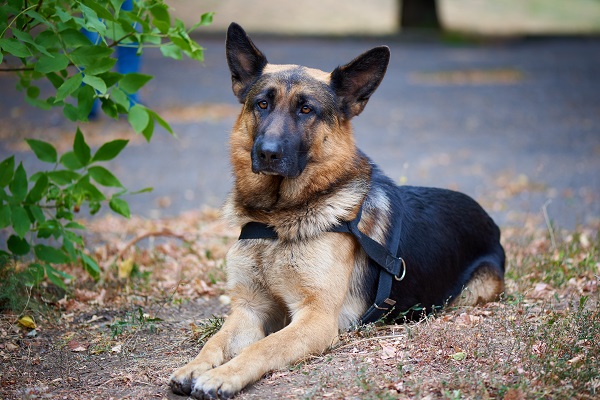Can a dog suffer from asthma? While asthma is not as common in dogs as it is among cats, they tend to suffer from asthma in much the same manner as humans. Dog asthma is an allergic condition. When a dog suffers from an asthma attack, it happens because of an allergic reaction that causes its airways to be inflamed, leading to spasming and constriction of the small airways in the lungs. Middle-aged dogs suffer from asthma, but it can happen to young dogs too. Smaller dogs are likelier to suffer from asthma compared to larger dogs.
Why do dogs suffer from asthma?
Asthma attacks are triggered in dogs when they inhale allergens. Some of the common allergens that can lead to such attacks may be enumerated below:
- Mold spores
- Air pollution
- Mold and dust mites
- Perfume
- Dust from cat litter
- Air fresheners
- Cat dander
- Airborne fertilizers or pesticides
- Pollens
- Smoke from cigarettes, e-cigarettes, and pipes
- Household cleaners

What are some of the symptoms of asthma in dogs?
If the dog has an asthma attack, it experiences coughing, wheezing, panting with a wide mouth, and difficulty breathing. If your dog is diagnosed with asthma, it could also experience too much phlegm and mucus building up. When the problem becomes severe, it can lead to a lack of oxygen that can turn gums blue. If a dog suffers from asthma, it could start to panic, and it could be hard to calm them down.
If a dog is experiencing an asthma attack, you must never try to close their mouths as it may bite, thus leading to injury.
The following are the most evident signs that your dog is suffering from asthma:
- excessive panting
- respiratory distress
- loss of appetite
- pale gums
- decreased energy
How are dogs diagnosed to have asthma?
If your dog does not have an asthma attack, it can be tricky to diagnose that particular condition. Therefore, it is so significant that you take your dog to a veterinarian ASAP (as soon as possible) whenever you notice any of the symptoms we have enumerated above.
Doctors usually diagnose dog asthma based on a combination of the findings from radiographs or x-rays & physical exams and the history of your dog that you narrate to the doctor. If your dog is not having an asthma attack when the x-rays are taken, the results could return to normal, and you may have to repeat the process.
The thing with asthma is that its symptoms are of the same type as that of heartworm disease. Therefore, the doctor may ask you to get a heartworm test done and ask if you are regularly providing them with heartworm medicines. If you cannot take your dog straight away to a doctor. Try and make a video of their breathing on your phone. You can then show that to the doctor when you reach their office.
How to treat severe asthma in dogs?
If your dog is experiencing an acute asthma attack, you must regard it as an emergency. In such cases, the vet may have to hospitalize your dog and place them in an oxygen cage so that it can be helped to breathe better. In such cases, the doctors may also put an IV (intravenous) catheter in your dog’s body to properly conduct fluid and drug therapy.
They may administer fluids if your dog is dehydrated or if they are not drinking and eating. As part of IV medicines, they may use steroids and/or bronchodilators.
If they suffer from an infection, they may use IV antibiotics. The three main components of treatment, in this case, maybe enumerated below:
- Bronchodilator – respiratory pet medicines relax their bronchial muscles and open their airways.
- Antihistamine – would provide them with allergy relief so that allergic reactions could be reduced.
- Steroid – it would bring down the levels of inflammation in their airways.
As part of the bronchodilators, doctors could administer the following:
- aminophylline
- theophylline
- terbutaline
Following steroids are usually used in these cases:
- prednisone
- prednisolone
- dexamethasone
In both these cases, you would need a prescription from the vet to administer them to your dog. Doctors recommend antihistamines such as loratadine and diphenhydramine. They could suggest administering Temaril-P, a drug that contains both a steroid and an antihistamine.
How to treat ongoing and mild asthma attacks in your dog?
Even in the mild cases, the pillars of treatment stay the same that we have enumerated above. You can administer pet medicine prescribed to your dog – you can give it through a nebulizer or orally. Nebulizers are medical devices that change liquid medicines. The following medications are prescribed by the doctors and administered as a form mist inhaled by your dog:
- bronchodilators
- antihistamines
- steroids
Some dogs get trained to go through nebulization. Hence, it is a great way to deliver medicines to their lungs straightaway.
They provide dogs with the added benefit of humidifying the air they breathe. It helps loosen respiratory secretions. Along with providing immediate benefits, nebulizers can help reduce the undesirable side effects of such medicines since they are inhaled rather than ingested.
Some such effects of these medicines are enumerated below:
- weight gain
- increased appetite
- excessive urination and drinking
- greater vulnerability to infections
- muscle loss
Nebulizing treatments are availed of at veterinarian hospitals too. You may buy your nebulizer so you can treat your dog by yourself. You can talk to the doctor to know if your dog would be suitable for such treatment. From them, you would get tips on how to train them to feel at ease with a nebulizer.
Dog Asthma Home Remedies
There are steps that you can take in this regard:
- Never vape or smoke near your dog
- Remove carpets from your home and replace them with hard floors
- Use a HEPA (high-efficiency particulate air) filter in your furnace – you can also use air purifiers in your rooms
- Wash their beds regularly
- If your dog goes outside, wipe them off with baby wipes to remove allergens.
- Use mite and dust-proof pillowcases and mattress covers
- Never burn wood or use the fireplace when your dog is nearby.
- Never burn candles or incense.
- If you have cats, use dust-free cat litter.
Along with providing them with the necessary medicines, it is essential to avoid the offending allergens so you can prevent your dog from having an asthma attack. You can ask the doctor if you should get your dog tested for allergies. It is a non-invasive procedure that determines things your dog is allergic to.
Frequently Asked Questions
Q: What are the symptoms of asthma in dogs?
A: The most evident symptoms of asthma in dogs are as follows:
- persistent cough
- rapid breathing
- energy loss
- heavy panting with mouth open and wide
- difficulty in breathing – it can be sudden at times
Q: What are the best ways to treat a dog with asthma?
A: Your veterinarian would likely recommend the medicines that would be necessary to treat asthma in your dog. It includes the likes of bronchodilators, steroids, and antihistamines.
Q: Why do a dog gag and whiz?
A: These issues in dogs happen when the normal flow of air out of and in the airway is blocked by something. It leads to a whistle-like sound when the dog is breathing.
Q: How do vets test asthma in dogs?
A: The methods vets use to test asthma in dogs include chest x-rays, collecting samples, and listening to their breathing using a stethoscope. It helps them determine if your dog’s symptoms are because of asthma.
Q: Should I be worried when my dog wheezes?
A: If your dog is wheezing, you must see a vet immediately. It is something that you must do without fail. It may be something as simple as allergies, but it could be something severe.
Conclusion
While there is evidence that dogs can experience respiratory symptoms similar to asthma in humans, such as wheezing and coughing, the condition is known as “canine asthma.” If your dog exhibits respiratory symptoms, seeking veterinary care promptly to determine the underlying cause and provide appropriate treatment is essential.
 DogExpress
DogExpress





















 in Chandigarh, India.
in Chandigarh, India. 

